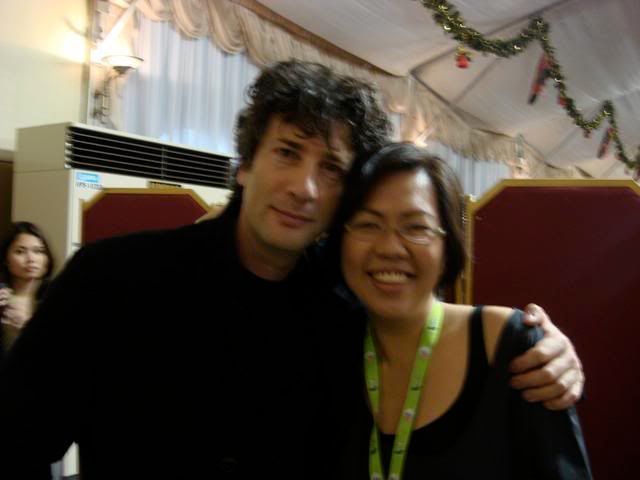I think it is a good measure of the man that people who had never read his work lined up to hear him read, and speak. I heard from Donna (who was handling the event) that there were people who tried to queue at half past midnight. Not all of them were old fans. Many had been drawn to the Saturday event by Neil’s talk on Thursday, where he spoke of elephant chains, fish caught in shadows and why writers always become facetious when asked, “Where do you get your ideas?”
When I met him, he was having breakfast with his son. He signed two books for Lucien. I had brought a pen for him, a Waterman 5 red ripple with a pink (flexible) nib, and we had a brief, lovely conversation about fountain pens before heading to the waiting area beside the stage.
I allowed myself 15 seconds of fangirl squeal-and-jump before taking the podium to introduce Neil. I referred to his Thursday talk (which is a very creative-director-tying-everything-together thing to do), told the audience the general flow of the morning’s talk and signing, and managed to squeeze in why Lucien’s name is Lucien (a factoid that elicited awwws from the audience, much to my surprise).
Neil read the entire first chapter of what he entitled The Graveyard Book, in the spirit of The Jungle Book, because instead of a boy raised by jungle animals, we have a boy raised by ghosts. “It takes a graveyard to raise a child.” We met a toddler who had difficulty with stairs that go up but had no fear of stairs that go down; Jack, an assassin; and Mr. and Mrs. Owens, dead 300 years and still with a yen for childrearing.
There were many questions from the audience, ranging from the serious (on the heartbreak of feeling unoriginal) to the urgent (who does your hair?). I combined the similar ones and worked in follow-up questions. On the elements of various myths and folklore he included in the Sandman, he mentioned that it did feel like the Myth of the Month Club at some point – this after he spoke of cultural tourism, and manananggals. The Q&A took about 30 minutes.
When we got down from the stage, he hugged me and said, “Good job!”
It was better than winning an Araw.
